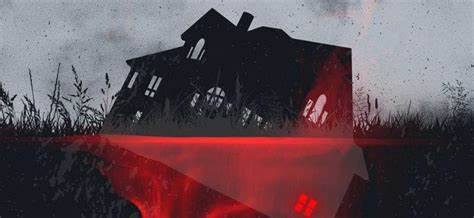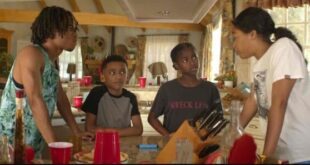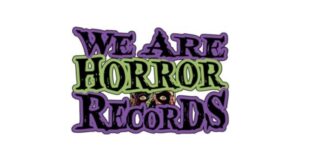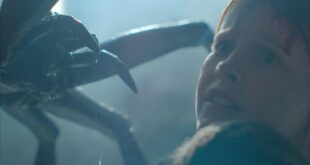If you read a lot of horror books, then you’ve probably heard of authors Nick Cutter (The Breach – read our other interview with him HERE) and Andrew F. Sullivan (The Marigold). Each has their own fanbase, and now these two genre literary powerhouses have joined forces to pen their first collaborative effort together, the sticky, goopy body horror novel, The Handyman Method.
A chilling domestic story of terror for fans of Black Mirror and The Amityville Horror.
When a young family moves into an unfinished development community, cracks begin to emerge in both their new residence and their lives, as a mysterious online DIY instructor delivers dark subliminal suggestions about how to handle any problem around the house. The trials of home improvement, destructive insecurities, and haunted house horror all collide in this thrilling story perfect for fans of Nick Cutter’s bestsellers The Troop and The Deep.
To celebrate the release of The Handyman Method, I chatted with Nick and Andrew via Zoom about how they came together as a team, their creative process, going from book to film, and more!
PopHorror: How did you two come together to write The Handyman Method, and what inspired the story?
Andrew F. Sullivan: Craig and his Nick persona, he and I had been buddies for years just through Toronto and writing, and he’d approached me and been like, “Hey, do you want to write a story?” And I was like, “Oh, of course! Why not?” And then we threw some ideas back and forth, but it didn’t really go anywhere for about a year, because he had a second kid. Life happens and we have our own books, and our own jobs, but we always had that friendship for the last 10 years or so. Then he came back and was like, “Okay, sure let’s do it, but what do you have?” The story for me had come from short horror films that are out there but also YouTube and how quickly you can get dragged down a hole into crazy stuff that you never saw. It didn’t really take much. You didn’t have to be looking for anything crazy, you just had to watch two videos in a row and then all of a sudden you’re watching something about like the new world order or the end of the apocalypse, and it’s being recommended to you by an algorithm. I wanted to play with what was behind that but also when you’re just trying to use the internet to do something helpful like fix something in your house.
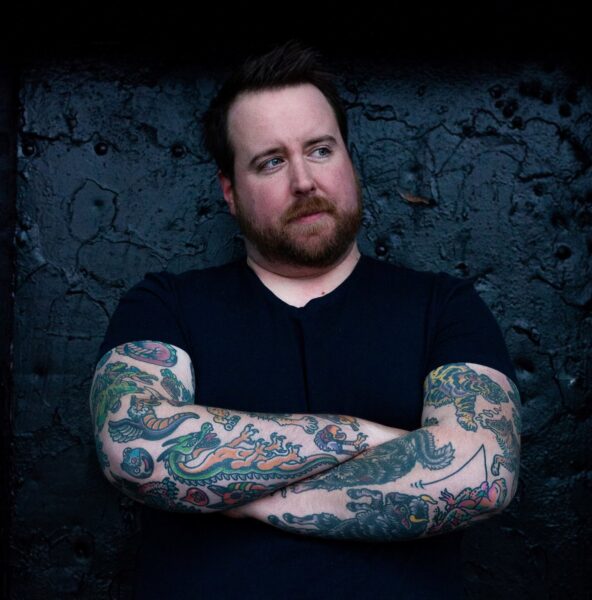
PopHorror: That’s me.
Andrew F. Sullivan: Yeah, and then how quickly it betrays you. And also kids as well, right? You’ve seen it with videos where they want to watch a Frozen video and then seven videos later it’s like, Elsa from Frozen and Spider Man go off and murder! And you’re like, what? No! I didn’t ask for this! So just how that came through on both ends. There’s this adult aspect and then there’s also this underlying part for the kids as well. The internet, it turns into almost a labyrinth, and you don’t really know where the thread even started. That’s where the story came from, for me at least. What do you think, Nick?
Nick Cutter: Yeah, I think that’s what’s interesting about it is it comes from that place for me too. I’ve certainly have had those things where I’ve sat my son down or my daughter down with an internet video on YouTube, and then I’ve come back and the algorithm is like, Zetas chop each other’s heads off in Mexico. What?! I put Thomas the Train on. It’s that, and it’s secondarily I think of being a father and a husband obviously, which we both are. I noticed that my generation – generations ahead of me a little bit, but behind me as well – my dimestore analysis of sociology is that men are having a difficult time dealing with the excellence of their partners often. That is something that maybe back when my dad was a husband and a father. It was accepted without any kind of explanation, like this is the direction the family is going, in terms of my career. It was just accepted. Even my mom, who’s a really driven individual, accepted it because it felt like societally in the 70s and 80s, that’s just how things went without any real kind of discussion or consequence. At least that’s how it worked in my family, and that was just a regular family. It’s not like my dad was a particularly domineering individual, but I think you’ve got a bunch of guys raised with that understanding and rubric of how a family works, and to discover that women of ensuing generations didn’t particularly find that all that good and didn’t benefit them. So now they’re looked to to have their own excellence and looked to to find their own way through the world that doesn’t involve the trappings of family and motherhood that maybe it didn’t in the 70s and 80s. There are some guys that really have an issue with that and are not able to cope with that in a way and it turns into a kind of anger and resentment that’s not really attached to anything. In some cases, their wives are the ones actually keeping the family afloat in a lot of ways. That was something that I saw transpiring around. It felt like it was percolating, and I wanted to home in on that. Andrew had his societal feelings that he was investigating, and I had mine, and we both overlapped in the genesis, if thematically, at some of the stuff that we were looking at. That’s sort of where it came from.
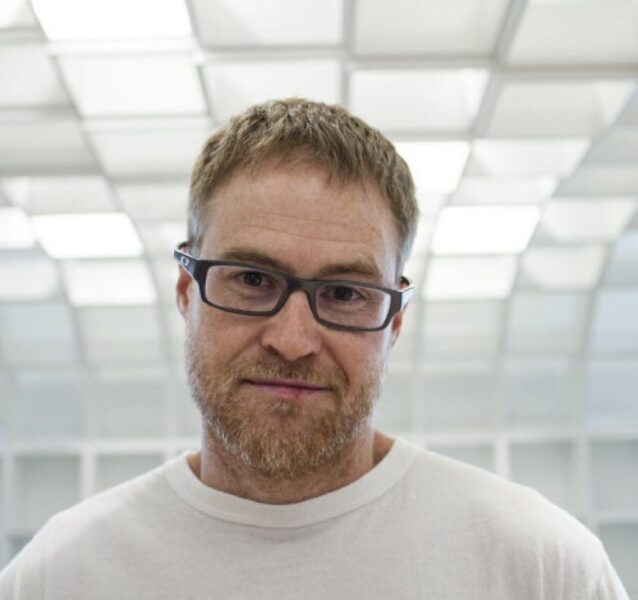
PopHorror: It is so easy to fall down a black hole on YouTube. Like so easy. I’ll be watching puppy videos and the next thing I know, I’m watching dash cams and car crashes and rescues, and the weirdest stuff. Like how did I get here?
Nick Cutter: And it happens so often that you have to wonder if the algorithm is like, if you’re not paying attention, we’re going to take… Because it never goes the opposite way. You never start off watching dash cam videos and then you find yourself watching puppies. It always goes the bad way.
PopHorror: It really does! And then it starts recommending car crashes.
Nick Cutter: You’ve had enough of good stuff, the heartwarming stuff. Now you need the bleak stuff.
PopHorror: Both of you are authors on your own, and I’m sure you have your own creative process. But when it comes to writing together, what is your process for that? Did one do one chapter, and the other do another? Or did you write them together? Did you bounce ideas off of each other? How did it come together?
Nick Cutter: It was a very strange process because as Andrew said, not only do I have a kid but also the pandemic was thrown in there. So often we weren’t able to sit down. We live separately.
Andrew F. Sullivan: Yeah, we don’t live together.
PopHorror: What?!
Nick Cutter: I tried to but Andrew said no, so that was the end of that but it wasn’t for the lack of my trying. And it started out, as Andrew said, as a short story and it sort of migrated into a novella and different people had different appraisals of where we should maybe push it. Unlike anything I’ve ever written before, it matured… It was like putting a little spore in a petri dish and watching it skein out in different directions. Andrew, maybe you want to elaborate on that?
Andrew F. Sullivan: Yeah, I think that’s a great way to start talking about it. A big part of it too was that we actually read each other’s books. We know each other’s styles and we felt comfortable, I think, to be like, “Okay, let’s collaborate.” If you respect the other person, that’s the first step. And then the second step was saying it started as a story and we didn’t overcommit at first. We weren’t like, “Oh, we’re going to do a five book series.” We have lives, we have our own projects, but we wanted to work on something together so it started as a story and then it turned into I would write 500 words, Craig would write 500, I would write 500, he would write 500, and we would be like, “Okay, what are we liking? What are the threads that are interesting? What are we pulling out?” And then you’ve built up that familiarity and comfort and it’s like okay, I’m going to run with this idea. Then you run with that one and we’d keep weaving them together and I think we were able to do that, and I think especially through the writing. For me, it was a lot of fun. That was the fun part, like “Oh, wow! This was like improv. We’re bouncing this idea off. Let’s go, let’s go!” And then the editing was a lot more like, “Okay, now we’ve got to actually figure out what the fuck we’re doing.” And luckily, we had a really strong editor at Saga, and Gallery, Ed. He’s a stickler, and you need that when you have two guys working together and you need a vision. You need someone who’s like, “Well, guys. Are you aware of each other?” And so he was there, our copy editors were really strong. We had a great editing team. But also working with Nick, it’s play and it’s fun. If it wasn’t fun, I wouldn’t want to do it. I think we’ve both collaborated with people before and in different ways, and I think in this case, for me, it felt really generative. After we’d work on stuff I was excited about writing, and excited about making stuff and going back to my own project like, oh man, I learned all this stuff from Nick, who has these horror books. I had a few books of my own, but stuff I’d never considered he was just bringing to the table and saying, “We’ve got to keep these things in mind.” Nick has read I think every horror book good and bad from like 1977 to 1995, and his influences like Clive Barker is such an essential part of his DNA that I don’t think people realize and I think Barker needs more appreciation now actually, as we’re getting more people dabbling in that sort of body horror and that extremity. Barker never blinked usually, and I think Nick doesn’t either. Learning from that, and then I bring my own. I’m a bit younger and I have some different influences and maybe I’ve read the greatest hits of what Nick has read. We’re speaking from the same place but he’s just got a much broader understanding and I think that really worked well. At the end of the day too, we would have email discussions, phone discussions, meet up in person a couple times, and watch Gremlins 2 again. It still has to be fun. All those things were important. At the end of that, just to say one last thing, when you’re working together you need a similar level of work ethic. If you get a draft, you’re both on the same page about, “Okay, this has to be back in two weeks.” And you do it, and it would be really hard if you were working with somebody who didn’t have that same sort of, “Okay, we’ve got to do the work.” Because at the end of the day, the book has to get done. Having that mutual understanding, I always felt super supported and backed up and ready to go.
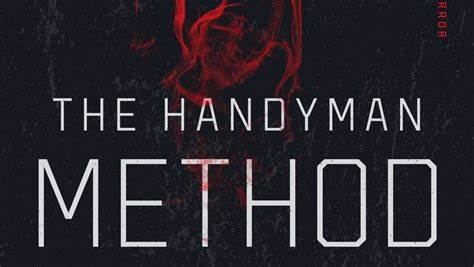
Nick Cutter: Yeah, me too. I think the most important thing at my age is you want to maintain the friendship too. Obviously, Andrew’s published books, and I’ve published books, and you realize in the end, a book is a book and it’s meaningful, and it’s an accomplishment, and it’s something that’s going to go on and have its own life. You really don’t want to sacrifice any kind of meaningful relationship long term with somebody in the process of trying to do that, but recognizing that writers are kind of siloed creatures that don’t often come out and touch antennas and sort of work something out together. Mostly that’s worked out for me and it’s definitely worked out for me with Andrew. I have another Andrew – Piper – that I’ve done some writing with and that’s worked out fine, but it hasn’t always. There’s been at least one experience that went kind of sideways, and it started from that level of friendship. That’s why I reached out to that individual. So I do know that it can go sideways and you can lose sadly, a close connection with somebody when you collaborate, so that’s become my main focus of collaboration, if I do it to really do your best to maintain the connection and the friendship.
PopHorror: With you guys being friends and this being a good experience for you, do you have any plans to collaborate on anything else?
Nick Cutter: Not right now, do we Andrew?
Andrew F. Sullivan: I would say… Okay, to be honest, a lot of it would be if we did this and then nobody liked it. I think honestly, we like it. I think what it is now, I’m very happy about it and I would be up for doing something again too. But it is a lot of work doing something with someone else. It’s a lot of planning, like even setting up an interview like this, you’ve got to get the two of us. We both have our lives. But yeah, I think actually there’s a lot of opportunities to do that and leaving it open there is something that Craig and I, or Nick and I, whatever identity he wants to use, have done and are excited about. I think there’s definitely an opportunity to do another one and it would be the man with 1000 projects, which could be either of us really. We both have a lot of books and I think that’s why we work together so well. We like telling stories. We still get some joy out of writing but it’s time. If we had the time I think we would do another one, but it’s finding that time and finding a project that we’re both excited about. Which is really probably me bringing an insane idea to Craig and then him being like, “I had a dream once like that!” And then we just start rolling. We never really closed any doors.
Nick Cutter: No, we did not.
Andrew F. Sullivan: We have a very open door policy, it’s just you think about all the work that goes into a book and we have enough drafts to show. It becomes something transformative. If anything, the fact that we’re both still very happy to hang out with each other probably means yes, there might be another one at some point.
Nick Cutter: Yeah, yeah. I think so.
Andrew F. Sullivan: It might be the Stephen King/Straub thing of like 20 years between.
Nick Cutter: Yeah, exactly. Or like Skipp and Spector. John Skipp and Craig Spector did it. There’s very few in horror I think, who co-write consistently. Or in any genre really. It’s kind of a rare thing. But anyways, I concur with Andrew. If an idea comes out of the blue that suits our mutual aesthetic and we feel that we can handle it, and again, depending on how this one does and how it’s received. I don’t care. I shouldn’t say I don’t care because of course I care, but that wouldn’t deter me from writing with Andrew again obviously, because I really respect him, respect his taste and aesthetic and really respect his drive. I think we spoke about that. It’s good to know that you’re with somebody who is as invested and committed and going to get down to the unromantic nuts and bolts of trying to kick a novel out together and it’s important to have that kind of foundation with one another. So I hope so, Tiffany. It’d be good down the line to try it again.
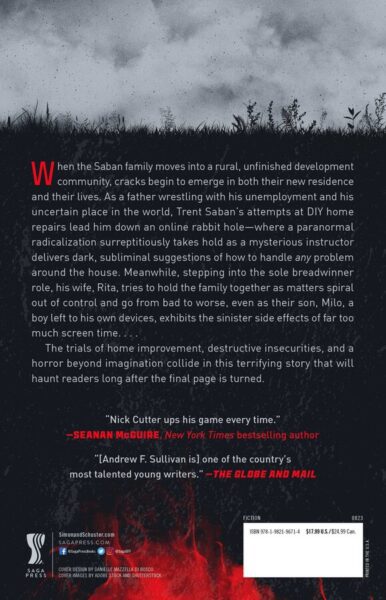
PopHorror: I hope so too. I really enjoyed this so I would definitely love to see you guys do something together again. If The Handyman Method was to be made into a movie, who would you want to play your main characters, and who would you want to direct it?
Andrew F. Sullivan: What do you want to say here, Craig? Do we wanna…
Nick Cutter: We can’t really because the writers strike is now happening and we don’t really know where the heck we are with it, but we could say that preceding the writers strike there was some conversations that I suppose we’ll pick up again after the writers strike at some level where a gentleman from Stranger Things was interested in the book and I guess playing Trent, the main character. We never settled on anyone to play Hank, which I think would be a super fun meaty role. Obviously Rita is a really important role as well so getting those three nailed down would be deeply important obviously. We’re not really letting the cat out of the bag because the cat might never commit to that specifically. We don’t know.
Andrew F. Sullivan: Yeah, I mean for us, I think there’s a lot of great options out there. I think with the strikes going on, this is something that people have shown interest in so… There’s lots of people. Honestly, okay this one I will throw out there. I would love to see Vincent D’Onofrio as Handyman Hank. I think that would be pretty wild. He’s such a great performer and I want him to bring that Criminal Intent energy, his ability to flip stakes and he’s such an interesting performer and also has that charm, but also menace. He can really turn quickly and that’s kind of what Hank needs, is he’s warm and inviting but he’s also way bigger than you. You’ve read the book. Handyman Hank has to be able to warm you up before he starts telling you to do some terrible things.
PopHorror: Yes!
Andrew F. Sullivan: So I would love that, and I think that’s something that would be really cool to see. It’s definitely a project that we’d love to see out there, and like Nick is saying here, honestly there are those three big roles, Rita, Trent, and Hank, and that’s the core of it. I think that’s how we see it, and directing-wise, there are so many great horror people out there. You want to find the people who would have fun with it and also who I think would be willing to get nasty with it. I think that’s what’s great about The Handyman Method is it’s fairly mellow at first and then it’s not afraid to get pretty extreme in the basement, which you have to be willing to open that door and walk down the stairs. Anybody from Ari Aster to Brandon Cronenberg to whoever.
PopHorror: I was thinking Brandon Cronenberg too!
Andrew F. Sullivan: Brandon Cronenberg, yeah. We’re Canadians so we love Cronenbergs.
Nick Cutter: I don’t know what you’ve seen lately, Tiffany, that you might… I saw the new Evil Dead and I thought that was really well done.
Andrew F. Sullivan: Oh yeah!
Nick Cutter: I thought that was really intense and really committed to that sort of aesthetic. Do you have directors other than Brandon that you’re… Not for this project, but just movies that you’ve seen recently that you’re like, “Oh that really did blow me away.”
PopHorror: I did see the new Evil Dead and I thought it was really great. David Cronenberg obviously. I’m always looking for the next Gaspar Noé or something new from Gregg Araki.
Nick Cutter: Oh yeah!
Andrew F. Sullivan: Yeah, those are great.
PopHorror: Takashi Miike
Nick Cutter: Ben Wheatley
Andrew F. Sullivan: Oh yeah, I would love to see Ben Wheatley do something. We both really love horror cinema as much as we do the work, the writing stuff. I think this is a book that is about screens and is about someone on the other side reaching out and fucking up your life. I think that’s definitely something we thought about. There’s so much up in the air with these things. We’re just really excited the potential for that is there and that The Handyman Method is something, even though it’s a book, it does translate. We’re asking you to imagine videos on the page so eventually someone will have to show those and they better also be pretty good at puppets. We need some puppets. We need a little boy puppet. Handyman is a really visual kind of… At the same time too, it’s isolating, it’s weird, it’s strange and there’s so many people who do…
Nick Cutter: The wheels are turning. We assume wheels are turning and those wheels could blow off the side of the engine and nothing will happen.
Andrew F. Sullivan: Yeah, exactly.
Nick Cutter: Before the writers strike, we were certainly taking some calls so that would be awesome were that to happen, but like anything else in my career in terms of movie stuff, you really just have to go numb and go limp.
PopHorror: I would love to see this on the screen. I think it would be amazing.
Nick Cutter: Thanks Tiffany.
PopHorror: It’s pretty gross on the page so bring me all the gross on screen.
Nick Cutter: Yeah, exactly. Put a lot of budget into some practical effects, that would be great. That’s what I miss. I miss just the practical effects. I’m such an 80s guy.
PopHorror: I have just one last question for you. I usually ask what’s your favorite scary movie. Nick, you and I have already discussed that so I thought I’d ask, what’s your favorite scary book?
Andrew F. Sullivan: My throwback one of like origin story of me… I’m going to cheat and do two here, Tiffany. Pet Semetary, for me, is the perfect Stephen King novel. It is deeply affecting, it is horrifying, it has clung to the inside of my skull for, I don’t know, 30 years? There’s just so much going on there. He does such a good job of really the great horror is the people and how we betray each other, and then just some terrible things happening. And then for recent ones, there is a novella by a Canadian dude named Ben Ruthnum called Helpmeet.
Nick Cutter: It’s a great book.
Andrew F. Sullivan: It’s basically like if Henry James and David Cronenberg hung out. It’s like 19th century body horror. It’s only like 100 pages, a really short book, but packs a huge punch. You’ll be thinking about it for weeks afterwards. Really, really, really smart take on horror and kind of sweet as well, which you don’t always get in horror. It balances someone’s face collapsing with like what does love mean? And I think that’s really a crazy thing to find in a book.
Nick Cutter: Yeah, I agree with that one for sure. Obviously, my influences are on my sleeve. We already mentioned Barker and King, obviously influencing all of the Cutter books. One Barker story I would recommend, one of my favorite short stories ever, In the Hills, the Cities, which is in one of his Books of Blood. I won’t explain it, but the imagination that Clive Barker has and has brought to bear is just fundamentally unearthly. Where that idea would have come from and the fact that he pulls it off so elegantly, and again, movingly. I think that’s the main thing, is that you have that level of artistry and that level of imagination combined with at his best, a real moving sense of these characters touching the infinite or the unearthly and how they react to it. And the second one is more common but like way after Stephen King/Barker, that 80s/90s stuff. I hadn’t found anything that really blew me away until House of Leaves.
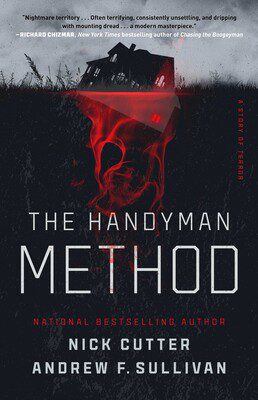
Thank you so much to Nick and Andrew for taking the time to speak with us. The Handyman Method is out now!
 PopHorror Let's Get Scared
PopHorror Let's Get Scared
